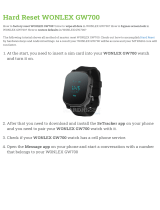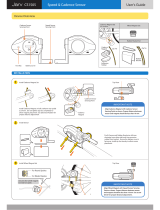
Settings for Running activities
Before you start an activity you can choose a training program and also decide what information you
would like to see as you train.
There are a wide range of metrics that you can choose to see while running including calories, heart,
heart rate zone, and distance.
Note: To get help on choosing which metrics you want to see during an activity, see Choosing
which metrics to display.
To choose to see just one metric for speed, average speed, pace, or average pace, move down to the
Settings menu. Select Metrics, then move right. Select Speed, Avg. Speed, Pace, or Avg. Pace.
To choose to see speed, pace, or both metrics, move down to the Settings menu. Select Metrics,
then move right. Select Speed, then move right. Select Speed, Pace or Both.
Settings for Cycle activities
Note: Cycle is available on the TomTom Multi-Sport.
You can log your heart rate, speed, and location using the integrated sensors when cycling.
If you want to review your performance while cycling, in the interest of your own safety it is best to
mount the GPS watch using the supplied bike mount
so that you can keep both hands on the handle
bars.
If you want to review your heart rate while cycling, we recommend connecting an optional external
heart rate sensor so that you can review your heart rate safely.
Setting the wheel size for use with a cadence sensor
If you are using a cadence sensor
, you should set the Wheel size setting to increase the accuracy of
the metrics provided by the sensor. This setting is the circumference of your rear tire in millimeters
(mm).
To set your wheel size, do the following:
1. From the activity start screen, move down to open the Settings menu.
2. Select Wheel size, then move right.
3. Set the size so it's correct for your rear wheel.
To find the circumference of your rear wheel, you can either measure the wheel yourself using a tape
measure or look up the value in an online calculator. For example, on this site you can find the
circumference using the diameter of the wheel and the thickness of the tire:
www.bikecalc.com/wheel_size_math
For example, if your wheel size is 700c and the tires are 25 mm thick, the circumference is 2111 mm.
This is the value you should enter.
Note: To get help on choosing which metrics you want to see during an activity, see Choosing
which metrics to display.
Settings for Swimming activities
Note: TomTom Runner Cardio and TomTom Multi-Sport Cardio are water-resistant. You can swim
with these watches. However, the built-in Heart Rate Monitor does not work under water.
Before you start a swimming activity, you should check two settings:
The Pool size setting for the pool in which you are swimming. This setting is the length of the pool
in meters or yards.
17























